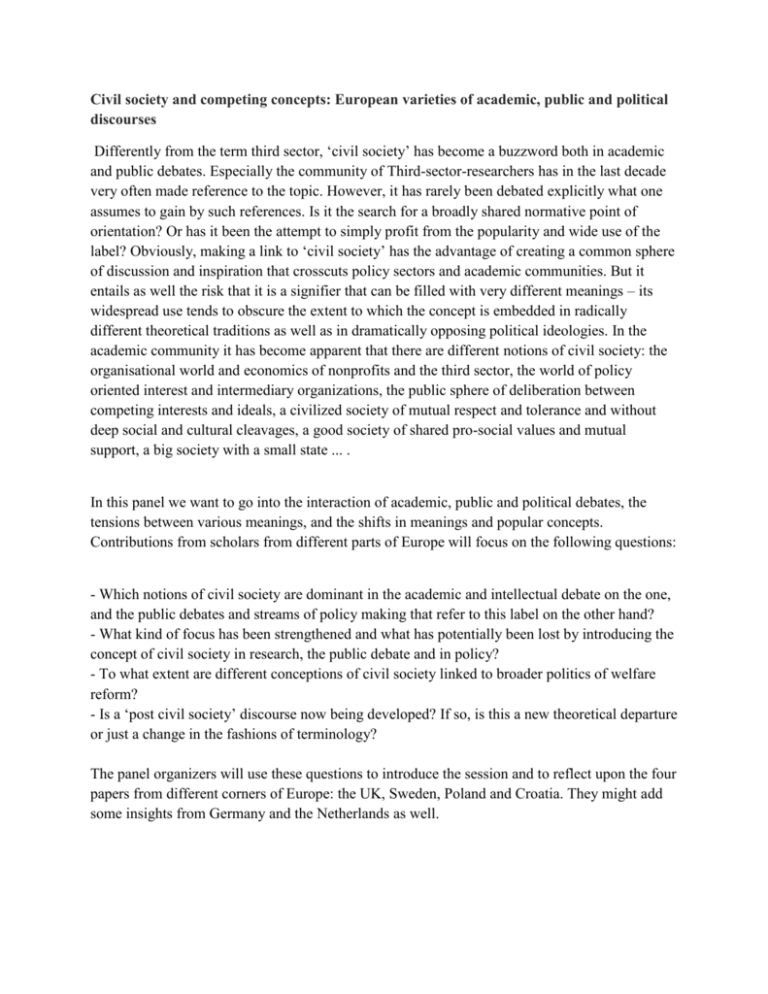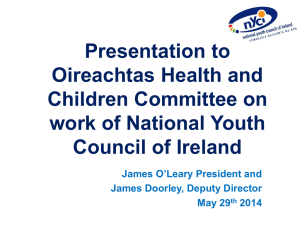Civil society and competing concepts: European varieties of
advertisement

Civil society and competing concepts: European varieties of academic, public and political discourses Differently from the term third sector, ‘civil society’ has become a buzzword both in academic and public debates. Especially the community of Third-sector-researchers has in the last decade very often made reference to the topic. However, it has rarely been debated explicitly what one assumes to gain by such references. Is it the search for a broadly shared normative point of orientation? Or has it been the attempt to simply profit from the popularity and wide use of the label? Obviously, making a link to ‘civil society’ has the advantage of creating a common sphere of discussion and inspiration that crosscuts policy sectors and academic communities. But it entails as well the risk that it is a signifier that can be filled with very different meanings – its widespread use tends to obscure the extent to which the concept is embedded in radically different theoretical traditions as well as in dramatically opposing political ideologies. In the academic community it has become apparent that there are different notions of civil society: the organisational world and economics of nonprofits and the third sector, the world of policy oriented interest and intermediary organizations, the public sphere of deliberation between competing interests and ideals, a civilized society of mutual respect and tolerance and without deep social and cultural cleavages, a good society of shared pro-social values and mutual support, a big society with a small state ... . In this panel we want to go into the interaction of academic, public and political debates, the tensions between various meanings, and the shifts in meanings and popular concepts. Contributions from scholars from different parts of Europe will focus on the following questions: - Which notions of civil society are dominant in the academic and intellectual debate on the one, and the public debates and streams of policy making that refer to this label on the other hand? - What kind of focus has been strengthened and what has potentially been lost by introducing the concept of civil society in research, the public debate and in policy? - To what extent are different conceptions of civil society linked to broader politics of welfare reform? - Is a ‘post civil society’ discourse now being developed? If so, is this a new theoretical departure or just a change in the fashions of terminology? The panel organizers will use these questions to introduce the session and to reflect upon the four papers from different corners of Europe: the UK, Sweden, Poland and Croatia. They might add some insights from Germany and the Netherlands as well. Paper Title (Panel Paper) Civil Society and Political Discourse in the United Kingdom Author Pete Alcock, p.c.alcock@bham.ac.uk; University of Birmingham (Presenter) Abstract Academic debate about the nature of Civil Society and its place in our understanding of societies more generally has a long and distinguished history. However, one particular strand of this debate has focused on the extent to which Civil Society is the conceptual means by which we can capture the totality of voluntary and community, or third sector, organisational activity within society. In simple terms – is Civil Society just a synonym for the third sector? This has become more important in recent years as political actors have been more openly concerned to promote Civil Society through policy interventions designed to encourage or sustain voluntary and community organisations. A political belief in the supposed values of Civil Society is thus translated into policy actions to support third sector organisations. This can be seen most clearly in the Big Society policies of the new Coalition government in the UK. Here Civil Society values (presented as the Big Society) are promoted by government, through an Office for Civil Society (previously known as the Office of the Third Sector), delivering a range of programmes aimed at supporting voluntary organisations. In England this is accompanied by a discourse which contrasts the desirability of voluntary and community action with the ineffective and overbureaucratised impact of state provision. This discourse is critically reviewed in this paper, arguing that this conceptualisation of Civil Society is contested, and drawing on the different discourses within the devolved UK administrations in Scotland, Wales and Northern Ireland. The paper concludes by asking whether Civil Society is constituted only within such contested political discourses and policy programmes, or whether there are enduring features which can form the basis of a theoretical understanding of its contribution to social order going beyond third sector organisation. Paper Title (Panel Paper) Civil society and varieties of academic, public and political discourses in Croatia Author Gojko Bezovan, gojko.bezovan@pravo.hr; University of Zagreb (Presenter) Abstract Transformation of meaning of the notion of civil society in different debates were depending on development of the sector and on involvement of different stakeholders in these processes. In the beginning of 1990s, dominant notion of civil society in academic debates were related to the social mobilisation in the form of civic movement actively involved in the process of democratisation of society and promoting the idea of pluralism in the public sphere. These reflexive debates were grounded in locally developed endogenous alternative initiatives and in practical experience of academic people being the member or, very often, leaders of these initiatives. By introducing the concept of civil society research focus was very much under influence on international comparative projects were some transitional countries made empirical evidence on the scope, structure, financing and role of civil society organisations. In that time secondary statistical data have been used as a source of empirical evidence for the justification of development of the sector. Public debates, from the beginning of 1990s, with dog-watch role of these organisations and initiatives, were dominated with the perception of such organisations as opposition to government, notion non-governmental organisation got a meaning as anti-government. Limited capacities and lack of skills of such organisations made then known as organisations acting under the motto ‘We are against’. Political debates on civil society were marked with facts that citizens politically engaged during the communist period or even some political leaders who lost privileged positions became the part of the staff of civic organisations with respective foreign funders supporting them. Legacy of relationships of civil society organisations and governments in other transitional countries is complex from confrontation to partnership in recent development. Civil society organisations for a longer period of time were perceived as a trouble makers or necessary evil. Insufficient rooting of civil society organisations in local communities and society (the concept of virtual civil society, building-up civil society without citizens), very often adversarial relationship with the state and para-state organisations responsible for funding of civil society and weak connection with private sector stress the issue of ‘meta level civil society’. Paper Title (Panel Paper) Civil society as Political Idea and Academic Concept: The Case of Sweden Author Lars Trägårdh, paul.dekker@uvt.nl; Ersta Sköndal University College (Presenter) Abstract Since the early 1990s the concept of civil society has been deployed in the Swedish public and academic debate. The original impetus was, in fact, political. Influenced by the renaissance of the concept in Eastern Europe, critics of the welfare state from both the right and the left used the term in their attacks on the centralized welfare state. Sceptical of the term at first, academics then also began to use the term in the context of a newfound interest in the size and character of Swedish associational life. Currently this debate has once again intensified in the context of political and legal reforms that, some argue, entail a fundamental shift in the systemic logic of the provision of healthcare, education, childcare, elderly care, etc, involving, some say, a move from a welfare state to a welfare society. This paper will attempt to describe and analyze the Begriffsgeschichte of several key concepts that belong together but also compete for discursive and political primacy: civil society, popular movements (folkrörelser), interest organizations, voluntary sector, non-profit sector, social economy, etc. Furthermore, the paper will ask the question of what, if anything is at stake in this struggle. To what extent does the linguistic complexity and confusion reflect deep change? Is the term civil society part of a discursive legitimation a radical shift in Swedish political culture, away from an older tradition of membership based and democratic organizations towards a US-style non-profit sector promoted by a state that seeks to shift responsibilities, services and costs from the public sector to a newly constituted non-profit sector. Conversely, to what extent is it merely an expression of a superficial and cosmetic proliferation of near synonymous terms, used strategically for pragmatic reasons linked to the increasing plethora of funding opportunities – both national and EU based, public as well as private – that require the flexible use of terms that are currently in fashion among policy makers and conceptual entrepreneurs. Paper Title (Panel Paper) Civil Society and Public Discourse in Poland Author Marek Rymsza, marek.rymsza@isp.org.pl; Institute of Applied Social Sciences, University of Warsaw (Presenter) Abstract In the public discourse in Poland ‘civil society’ is used in a few different contexts: (1) It is tendency to explain the phenomenon of the Solidarity (1980-1981) movement in the framework of ‘building civil society’ under the communist regime although such a term was not used during that time neither by the movement activist nor by the government. (2) Non-governmental organizations are seen as institutional representatives of the civil society. It has to be stressed that some of the crucial organizations of the third sector infrastructure appeared in the first years of transformation with the substantial financial support from the foreign donors (especially American granting foundations) interested in strengthening infrastructure of civil society in a new-born democracy. Those NGOs try to support their ‘civil’ public image although their day-to-day activities has became less civil-oriented. (3) The NGOs from the mainstream are criticized for being too much grant-oriented and too little grass-rooted entities. That is why some new-born, more radical organizations and movements, reluctant to the Hegel’s vision of the functional union between the state and civil society currently try to use a civil society rhetoric to dismantle both the NGOs main-stream and the patterns of cross-sector co-operation. (4) Nevertheless, the main feature of the Polish third sector as a whole, based on the Solidarityrooted experiences, is a tendency to identify its mission in the terms of common good and public interest. It distinguishes the Polish non-profit sector from the third sector infrastructures of most European developed countries which look more as conglomerates of more particular groups, ‘branches’ structures and umbrella coalitions. (5) The idea of civil society appears also in the social policy discourse which focuses on an increasing role of the non-profits in delivering social services described as a shift ‘from welfare state to welfare society’ and a way to promote a cross-sector partnership in public benefit activities. The paper will try to describe trends and frames mentioned above with a special attention to clarifying new-born sociological concepts constructed by researchers and analysts.





